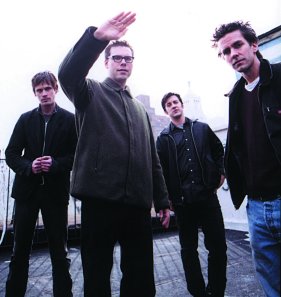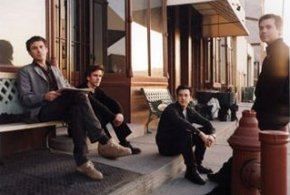
http://www.kindamuzik.net
ernaast
Onze laatste liverecensie.
Onze laatste albumrecensie.
Ons laatste interview.
Onze laatste video.
Girls Against Boys
"What's new Pussycat," preaches Girls Against Boys frontman Scott McCloud on the band's latest release You Can't Fight What You Can't See. It took them four years, but GvsB are back in the ring. On a new label and with eleven fresh songs, but still holding on to their characteristic sound of double bass guitar and lyrics related to modern poetry. Read on for more on the finer art of mixing love songs with lines from designer clothing.
Tekst: Dennis Elbers
Publicatiedatum: 08 juni 2002
 After four years, a new chapter has been added to the Girls Against Boys
story. A chapter of fighting things that were hard to see. Back in 1995, New
York City-based GvsB signed with major record label Geffen, anticipating more
promotional support than with a smaller independent label. Nevertheless,
expectations were quite realistic, according to the band's singer and guitar
player Scott McCloud: "They couldn't expect us to write a radio hit, so we
turned out being one of those bands signing to a major label, without having
high priority." Shortly after releasing their first Geffen release
Freak*On*Ica, the label changed hands, and after a tour with Garbage, all
communications from the label's end were dropped.
After four years, a new chapter has been added to the Girls Against Boys
story. A chapter of fighting things that were hard to see. Back in 1995, New
York City-based GvsB signed with major record label Geffen, anticipating more
promotional support than with a smaller independent label. Nevertheless,
expectations were quite realistic, according to the band's singer and guitar
player Scott McCloud: "They couldn't expect us to write a radio hit, so we
turned out being one of those bands signing to a major label, without having
high priority." Shortly after releasing their first Geffen release
Freak*On*Ica, the label changed hands, and after a tour with Garbage, all
communications from the label's end were dropped.
"We already had ideas for a new record," McCloud explains, "and wanted to record a more stripped-down record in 1999 as a reaction to Freak*On*Ica, which was produced in a direction we were more or less forced in by our record company. This record should have been released early 2000. Demos were made, but the possibility to release a record never really existed. We didn't know whom we were dealing with, the creative process slowed down, and we had a very hard time. Doing nothing, and the insecurities of course, caused a lot of tension between the band members." Fortunately, other creative outlets like running a bookstore, production work, and touring with side-project New Wet Kojak resulted in fulfilling the creative needs for all members during this period.
Finally in 2001, Girls against Boys managed to get out of their deal with Geffen and signed up with the small, independent Jade Tree to release You Can't Fight What You Can't See, the record that had been in production for the past four years. "We already had a lot of songs lying around. In the span of those four years, as a band we went through every conceivable frame of mind about what we do. The first songs we wrote after the whole thing were pretty aggressive. Stuff like this influences you a lot. But you don't want a pessimistic album, so we tried not to worry about it too much and just did the thing we do. Now, after releasing this album, my hope is making the band vital again, get the band back into its creative entity."
 Despite the hardships, the band managed to bring their typical dark sound
and vibe, one characterised by two bass guitars and lyrics related to
modern poetry, back on record. McCloud is constantly playing with words and
comes up with great slogans, statements, and one-liners. "I just write
phrases that I like. Most of them come from late night situations: people
talking in bars, just normal conversations. I catch their words and phrases,
and I try to put them into a theme that interests me. I also work a lot with
repetition, so things start to sound like a slogan but in fact they might be
personal."
Despite the hardships, the band managed to bring their typical dark sound
and vibe, one characterised by two bass guitars and lyrics related to
modern poetry, back on record. McCloud is constantly playing with words and
comes up with great slogans, statements, and one-liners. "I just write
phrases that I like. Most of them come from late night situations: people
talking in bars, just normal conversations. I catch their words and phrases,
and I try to put them into a theme that interests me. I also work a lot with
repetition, so things start to sound like a slogan but in fact they might be
personal."
Considering the band's struggle of the past four years, one might expect the
album title You Can't Fight What You Can't See to be a reflection on the
past four years. "It is actually a phrase out of a song that isn't even on the
record, but it reflects the content of the record very well. It is a
personal thing, you can't fight a thing about the way you are. All themes of
the songs seem to have a struggle element," McCloud explains.
That struggle is something McCloud observes in the world around him and tries to work out in his lyrics: "They are not meant as a comment, just a reflection of the things I see. No right or wrong, for isn't society guiding itself? Shouldn't all things be simple? Hardly ever do I have a theme that I want to tell people like this is what I think about something, or this is how I politically think about this or that. I'll just have a love song and throw in some designer clothing line and it all wraps up together."
 The rise of the Internet has made record sales drop, and everybody seems to
agree it affects everyone making music. McCloud fears the consequences the
Internet has on record sales, but also realises that there is a positive
side, for the Internet is also a great medium to discover new bands: "I find
it cool in a way just to listen to stuff. I don't usually download entire
records or anything. Just to be out there and listen to stuff before you go and
buy it. You can read in magazines about music as much as you like, but it is
still all about listening. But I do not really see how the decrease in
record sales can be stopped, or it should be by making CDs more compelling.
You can think of adding visual extras that extract from the concept of the
record, just as long as you do more than simply adding a 'making of'
section."
The rise of the Internet has made record sales drop, and everybody seems to
agree it affects everyone making music. McCloud fears the consequences the
Internet has on record sales, but also realises that there is a positive
side, for the Internet is also a great medium to discover new bands: "I find
it cool in a way just to listen to stuff. I don't usually download entire
records or anything. Just to be out there and listen to stuff before you go and
buy it. You can read in magazines about music as much as you like, but it is
still all about listening. But I do not really see how the decrease in
record sales can be stopped, or it should be by making CDs more compelling.
You can think of adding visual extras that extract from the concept of the
record, just as long as you do more than simply adding a 'making of'
section."
However, these ideas require a lot of work and are quite costly, and so for now, the band is just making music again: "At this stage we made a record we all feel good about. Not a new beginning — just happy we did the record at all. We are really looking forward to touring again. Check us out in Australia this June, in Europe at the summer festivals and in September in the States in a club near you!"
http://www.kindamuzik.net/achtergrond/girls-against-boys/girls-against-boys-1607/1607/
Meer Girls Against Boys op KindaMuzik: http://www.kindamuzik.net/artiest/girls-against-boys
Girls Against Boys audio en video:
» Audio: Black Hole (3voor12)» Live opname: Girls Against Boys live in Club Lek 23-10-2002 (3voor12)
» Live opname: Girls Against Boys live op Tombola 2004 (3voor12)
Meer Girls Against Boys op KindaMuzik:
» Live-recensie: Girls Against Boys / Lumerians» Interview: Girls Against Boys
» Bezoek de Girls Against Boys artiestpagina
Vind je Girls Against Boys goed? Lees dan ook bij KindaMuzik over:
» Plastikman» Lamb
» Spiritualized








Deel dit artikel: